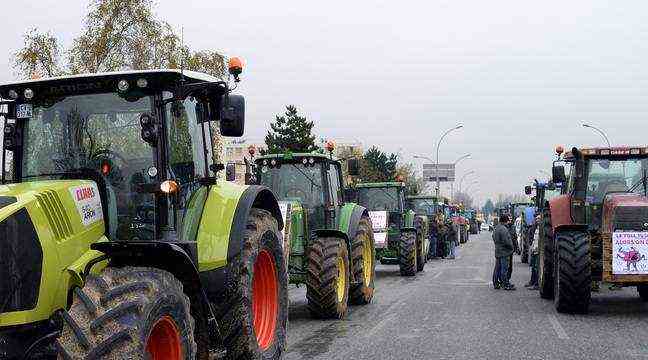Ile-de-France farmers are planning snail operations in Ile-de-France this Friday to denounce the conditions of the future common agricultural policy (CAP). – MARTIN BUREAU / AFP
Traffic jams to be expected: farmers in and around Ile-de-France are planning to take out the tractors on Friday to send a “warning” to the government on the roads against a reform of European aid which would give priority to organic and agroecology.
“We decided to take union action across the large Parisian basin on Friday from 6 am. We have the ambition to send a message to Emmanuel Macron as a warning, ”said Damien Greffin, president of the FNSEA Grand Bassin Parisien, during a press briefing.
Snail operations and filter dams
On the menu for this day of action, from 6.30 a.m., snail operations and filter dams: the latter will concern in particular the Ile-de-France in ten places, such as on the A6 in the direction province-Paris, in the at Villabé (Essonne), or on the RN12 towards Paris, at Maulette (Yvelines), as well as the A13, in the direction Paris-province.
What disrupt the departures of Ile-de-France residents who would like to take advantage of the Easter weekend to go green, after the tightening of the constraints announced Wednesday by Emmanuel Macron, even if the stated goal is not to block the roads all day.
This interdepartmental branch of the majority union includes a dozen departments, from part of Normandy to part of Champagne-Ardenne, via Ile-de-France and Hauts-de-France.
Eco-diets in the crosshairs
France is currently working on its national strategic plan (PSN), its version of the future common agricultural policy (CAP) which it is due to present to the European Commission in June, like its neighbors in the EU. A complex exercise, bearing in mind that the general framework is still being negotiated in Brussels.
In the sights of farmers on the roads Friday, eco-schemes or “eco-scheme”, a new source of funding conditional on the establishment of more environmentally friendly practices. The Commission could thus demand the maintenance of more “permanent meadows, the stop of the decline of biodiversity, the reduction of phytos and fertilizers”, according to a working document of the Ministry of Agriculture.
“According to preliminary projections, in the current state of affairs, 70 to 80% of farmers would not have the possibility of benefiting from this eco-scheme, certainly voluntary”, estimated Damien Greffin.
Defend their income
This new type of aid, as it is envisaged, “will be extremely complicated to reach for a good majority of farmers in the Paris basin, but more widely around, because these are increasingly important agri-environmental measures. , more and more restrictive ”, complains Stéphane Sanchez, director of the FNSEA Grand Bassin Parisien.
Damien Greffin, a cereal farmer in the Essonne department, fears that farmers who do not fit into the boxes of these eco-schemes will lose “from 60 to 80 euros per hectare”.
“What makes the backbone of a farmer today is his market, that is to say, he produces in relation to what he is going to sell. There, we take the problem backwards, we are brought into agroecological terrain without necessarily ensuring that we will have the market behind, ”adds Stéphane Sanchez.
“Do organic? Very good, as long as it can be sold at 30% more »
“Do organic? Very good, as long as it can be sold at 30% more. If it is to make organic at the price of conventional, it is the death of agriculture, ”he adds. “We are not against progress, we want it to be done in stages, so as not to exclude farmers,” concludes Stéphane Sanchez.
Questioned on this subject this week at the National Assembly, the Minister of Agriculture Julien Denormandie stressed that the reform of the CAP was “in the process of consultation”, a way of saying that the arbitrations were not final on the distribution. of this budget within the agricultural world.
Last week, thousands of breeders demonstrated in Clermont-Ferrand and Lyon, in particular to protest against a possible reduction in CAP aid deemed essential to the “survival” of cattle breeding. In question, in this case: a possible redeployment of aid in favor of vegetable proteins.

